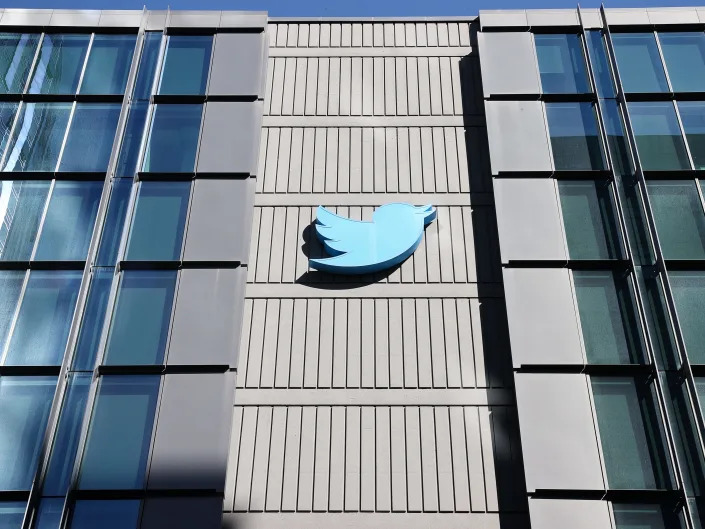Byjus, Meta, Twitter: India tech workers fight back amid mass layoffs
 GETTY IMAGES
GETTY IMAGESThousands of young Indians are suddenly staring at an uncertain future as technology companies and start-ups announce mass layoffs due to global headwinds and funding crunches. But many are refusing to stay quiet about it.
In October, when Ravi (name changed on request) realised that he and several colleagues were likely to lose their jobs with a major Indian edtech firm, he immediately set up a private messaging group with them.
The group soon became a "safe space" for Ravi and his teammates to air their fears, share tips on dealing with the management and discuss labour laws and workers' rights.
"It helped many in the team negotiate better exit policies with the company," Ravi says.
The past few months have been difficult for Indian workers in private companies - especially in the tech sector. Edtech firms Byju's and Unacademy have cut hundreds of jobs; social media giant Twitter has laid off more than half of its staff in India and Indians are among those affected after Meta - Facebook's parent company - shaved off about 13% of its 87,000-strong workforce.
The spate of layoffs has sparked outrage on social media and many of those affected are turning to the internet - like their counterparts in other countries - to air their dissatisfaction and form support networks.
They're tweeting about unceremonious firings, asking for jobs on LinkedIn, and using messaging platforms such as WhatsApp and Slack to rally colleagues, assert their rights and share information with journalists.
 GETTY IMAGES
GETTY IMAGESThis is partly because the culture of shame and silence that once existed around redundancies in India is gradually wearing thin as mass layoffs become more common.
Pritha Dutt, a management and development sector professional, says that even a couple of decades ago, terminations were most likely chalked up to "a performance issue".
"Today, layoffs and downsizing have become accepted business practices, so terminations are no longer a taboo topic," she says.
And while the jury is still out on how effective social media is as a tool for redressal, experts say that it is helping unite and amplify voices, especially as trade unions are no longer as powerful as they used to be.
While millions of Indian workers still belong to trade unions, the movement as a whole has been weakening for years. A number of factors - including burgeoning private sector jobs, new labour reforms and a rise in contractual work - have played a role in denting their membership and might.
"Along with employers making themselves more accessible, social media too is giving employees a platform to air their grievances, thereby reducing the need for a mediator - a role traditionally played by unions," says Professor Chandrasekhar Sripada at the Indian School of Business.
 GETTY IMAGES
GETTY IMAGESAfter Byju's announced in October that it would "rationalise" about 2,500 employees to "achieve profitability", many of its employees have been speaking to the media - often anonymously - about the company culture and the pressures they face.
Sacked Twitter employees have taken to social media to vent their frustrations. "Always a Tweep never a Twit," tweeted one former employee in a veiled reference to new owner Elon Musk's Twitter bio at the time. "Got fired without even a confirmation email. There's always a new low," said another.
With the job market expanding, Ms Dutt says employees have become more confident about the marketability of their skills and don't mind standing up for their rights, even if that means burning bridges by calling out a person or organisation on social media.
And this public outrage can sometimes help, like pushing employers to apologise for firing staff in an insensitive manner or for promoting a toxic work culture.
But Ms Dutt cautions that this success could be limited and short-lived. The option may also not be available to everyone - many still fear speaking out as they worry it might jeopardise future job prospects, or invoke legal action from their employer.
 GETTY IMAGES
GETTY IMAGESThat's why many employees are also looking for other ways to air their grievances and fight for their rights.
In the southern city of Thiruvananthapuram, 140 Byju's employees who alleged they were being forced to resign went on a protest and also met a Kerala state minister, who announced an investigation into the matter - the state is governed by a coalition of Left parties, which advocates for workers' rights.
Days later, Byju's said it had reversed its decision to shut down operations at Thiruvananthapuram.
Three former employees at an edtech firm told the BBC on condition of anonymity that they were working with a trade union to negotiate severance and notice periods with the company.
Suman Dasmahapatra, president of the Bangalore chapter of the All India IT & ITeS Employees' Union - a registered trade union that has been assisting hundreds of tech employees with labour disputes since 2018 - said that the organisation's membership has been steadily growing.
He concedes that this is still tiny compared with the total number of employees - a majority of IT sector professionals, he says, are still uncomfortable being part of trade unions, either because they fear reprisal from the management, or because "they don't see themselves as 'workers'".
But Mr Dasmahapatra says he is confident that India will see a resurgence in unionisation as the push and pull of global economic forces make the job market more volatile.
Over the past couple of years, US giants such as Amazon, Starbucks and Apple have seen their workers form unions and observers say calls for unionisation are likely to grow louder, and spread across industries.
Prof Sripada, however, disagrees. He says that the proliferation and strengthening of trade unions need not become the norm, as workplaces have already become more conscious about adopting progressive, people-centric policies.
"Unions are a product of bad people management. When employers fail, unions rise. Employers today have the benefit of hindsight so the responsibility lies with them to make people management the centre of business," he says.
"But if organisations continue laying off people in an insensitive and callous manner - as we're seeing happen frequently - the story might be different."





